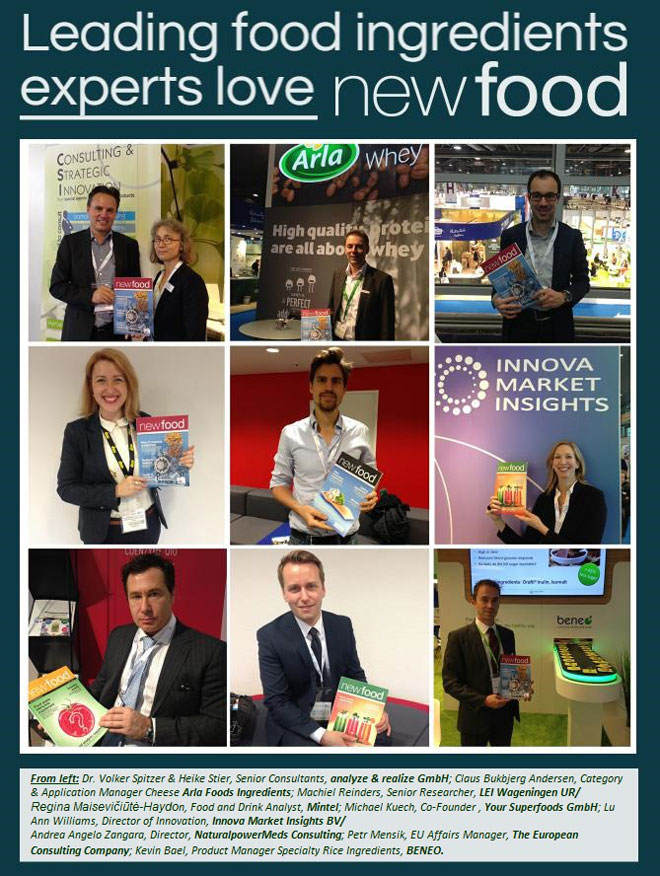Is healthy food out of reach? No, but we need greater education
Posted: 10 April 2017 | Stuart McDonnell | No comments yet
An argument from Stuart McDonnell in favour of education above all to improve intake of healthy food…


In response to an article within New Food‘s Health Ingredients Month earlier in the year that argued that healthy food is too expensive for most of us, Stuart McDonnell offers his reaction.
Healthy food is not out of reach for most providing education plays a big, positive role to create motivation to change habits and to empower us with knowledge and most importantly, an enjoyment of the ‘healthy food journey’.
The basic premise of healthy eating is centred around: Simple, fresh ingredients, a greater intake of vegetarian-based meals and natural flavourings which enhance any food but which exclude or minimise sugar and salt intake. These are all available to most of us. If they are not available to some then the reasons as to why must be identified and others must ensure that possibly the most vulnerable sections of society are identified and provided with help.
How to select, buy, prepare and cook foodstuffs is essential knowledge that would enable people to take control and have confidence in producing healthy food. Certain players in the food industry use temptation in order to maintain ‘relationships’ and perhaps create ‘addictions’ and this is something that we need to address. Treats are not a problem providing they constitute a minor part of a regular diet.
The skill of reducing food intake is also extremely important. Comfort eating needs to be reduced through education, stress reduction in everyday life and importantly with supported self-motivation to avoid issues such as obesity.
If we look at the statement ‘Healthy food, it’s out of reach for most of us’, I find it to be an immediately negative proposition and one that has already taken hold in many people’s deep rooted assumptions about healthy food being more expensive and therefore not a viable option.
There is no reason to assume that changing to a healthy diet requires greater expenditure providing healthy food is not defined by price tags, promotions or marketing spin.
I would argue that the most important factor in trying to improve health in relation to food is directly attributable to reducing food intake because a modest but consistent, on-going reduction generates amazing results in a relatively short time. I am not advocating dieting because this implies commercial agendas, set by others which often lead to ‘failure’.
I believe there are, in fact, financial savings attributable to reducing one’s food intake. For example, the additional cost of ingredients and food waste associated with preparing more than can be eaten in the first place, if reduced, would provide the additional cash which might in turn allow for the purchasing of healthier ingredients.
Before engaging with the multi-faceted role of education however, I must address the role of sugar in food or drink and industry sectors that provide it and use it. It is clear that sugar tempts us all at one time or another because it can make certain foodstuffs more palatable, more soothing, more pleasing, more tempting, more ‘addictive’.
There, I’ve said it, ‘Addictive’.
If it’s ‘addictive’, it hooks us in. Why does ‘addiction’ play such an important role in our lives when most would say we do not succumb to addiction?
I would argue that this is so because food producers who include excess sugar in their foodstuffs know fine well that sugar is cheap, it elicits craving, it provides sugar ‘hits’ and thus generates a sense of euphoria and a sense of comfort or well-being.
If education is the way forward and it is, then we need to explore the term ‘education’. Education is provided by teachers and educators; but we must define who or what is a teacher or educator. An educator might be viewed as someone who or something that imparts knowledge but not necessarily fact. A teacher might be viewed as a person who is trained to impart knowledge and fact on an on-going basis and that for the most part it is accurate. However, knowledge and fact can be flawed, particularly in relation to scientific fact. New discoveries are evermore being made which contradict what, up until this point, was considered as ‘fact’.
Producers provide what the retailers require; and what the retailers require is founded on consumer reactions to new products and preferences as discovered in their market research. What hits the shelves is based upon this research but importantly, it is also based upon costs of production, purchasing, promotion and profits. Fundamentally, a missing ‘p’ from this list is ‘people’ ie: consumers.
The upheaval of the food production system and must begin with the word ‘healthy’
Inevitably, the first influencers in our food ‘education’ are parents and grandparents, guardians or perhaps extended family. These are our primary educators since, in the early days of young lives, Mum, Dad or guardian ‘knows best’.
So, we must ask ourselves which habits are these educators are driven by when it comes to healthy eating? Is bland flavour a driver of ‘convenience’ for parents wishing to maximise the chance of their children eating something? Producers and retailers prefer the ‘let’s keep it bland’ approach because mass acceptance means efficient production and yields which mean better margins as well as mass sales.
The essence of my thoughts is that we require a complete upheaval of the food production system and this must begin with the word ‘healthy’. I would argue that if a healthier population meant lower NHS treatment costs, then, as a society, we could see the money saved being used to ensure the entire population has access to healthier food and healthier food buying habits.
Healthy eating is available to all, only if the people and organisations who have the most influence over it are willing to exert their powers and make it happen. Those people are us and the organisations are those that we pay our money to when we purchase food, or cast our votes for during elections. They and we are all accountable for not ensuring that healthy food is within reach of us all.
What do you think is the best approach to encouraging a healthier diet? Education or would a more regulatory approach be more effective? As ever, we invite you to share your views below and to subscribe to New Food for free, click here.


Health Ingredients Month
Tom Clifford, PhD, Sport and Exercise Nutrition, University of Northumbria – Can beetroot help relieve muscle pain after exercise?
Petr Menšík, Manager, EU Affairs, ECCO, The European Consulting Company – Defining the term ‘natural’ in food and beverage
Claus Andersen, Category & Application Manager, Arla Foods Ingredients – How dairy can lead a new waste revolution
Alex Murtough, Field & Marketing Manager, Oppo – Healthy food? It’s out of reach for most of us
Kevin Bael, Product Manager, Specialty Rice Ingredients, Beneo – The unique, natural value of rice starch
Andrea Zangara, Centre for Human Psychopharmacology, Swinburne University – Plant-based ingredients and their cognitive benefits
Marc Fremont, Ph.D. R&D director, VF Bioscience SAS – Cell culture: an innovative approach for production of plant actives
Lindsey Bagley, BA, CSci, FIFST, Flavour Horizons – Lifting the lid on the clean label trend
Vitafoods 2017
To get in touch with a representative from New Food at Vitafoods 2017, click here.









